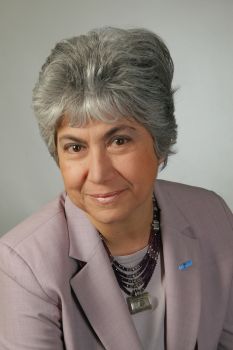IPS U.N. Bureau Chief Thalif Deen Interviews FLAVIA PANSIERI, Executive Coordinator of UN Volunteers
UNITED NATIONS, Jun 13 (IPS/TerraViva) – When the Rio+20 summit gets underway in Brazil next week, the estimated 50,000 to 60,000 participants will not only include world leaders, government delegates and U.N. staffers but also a staggering array of activists from the far corners of the world.
The United Nations has identified some of the major participating groups to include farmers, businessmen, trade unionists, consumers, workers, students, indigenous peoples, religious leaders, academics, members of civil society and representatives of the international media.
But there will also be well over a thousand “volunteers” providing their services virtually gratis under the umbrella of UN Volunteers (UNV).
Every year, about 7,500 qualified and experienced women and men of around 160 nationalities serve as UN Volunteers in some 130 countries.
In an interview with IPS U.N. Bureau Chief Thalif Deen, Flavia Pansieri, UNV’s executive coordinator, said UNV is very pleased to be able to contribute to a project, in conjunction with the Brazilian Government and UNDP, “to bring the Rio+20 Conference to the people of Rio de Janeiro”.
Through this social inclusion project, she said, about 1,500 volunteers from less favoured communities and universities will support the organisation of the conference.
Excerpts from the interview follow.
Q: What progress have you made in your “volunteer action counts” campaign for sustainable development?
A: Since its launch in April, the “Volunteer Action Counts” campaign has been a tremendous success, with more than 1,000 volunteering stories submitted and over 63 million volunteer actions counted so far on the campaign website.
In Mozambique, for example, over 700 volunteers have been mobilised through an initiative by a UK-based international voluntary organisation to support people living with HIV and AIDS. Among other things, the volunteers tend to vegetable gardens that provide food and medicinal plants for people living with HIV and AIDS.
In Estonia, through the “Let’s do it!” campaign, 50,000 volunteers cleaned up the entire country of illegal garbage in just five hours collecting 10,000 tons of garbage.
In China, India, Indonesia, Philippines and Thailand, nearly 5,000 young Habitat for Humanity volunteers laid bricks, mixed cement and wielded hammers to help more than 500 families in just one day.
This simultaneous multi-country build event marked the culmination of a five-month long Habitat for Humanity Youth BUILD campaign to raise funds for, and awareness of, the dire housing situation in the Asia-Pacific region.
Q: How successful is the concept of volunteering in the U.N. system?
A: In 2011, more than 7,300 UN Volunteers worked for peace and development with UNDP and other U.N. agencies around the world, helping people to lead more productive and fulfilling lives through quality education and improved healthcare, or by ensuring equitable access to resources and sustainable practices.
To date, more than 14,000 UN Volunteers have served in more than 40 different peacekeeping and political and peacebuilding operations. Currently, more than 2,400 UN Volunteers are supporting 17 U.N. peace operations. They work in more than 120 functional categories, from human rights advisers to supply managers, electoral observers to press officers.
Q: How difficult is it to find volunteers against the backdrop of a spreading global financial crisis?
A: Volunteerism is a fundamental source of community strength and resilience that exists in all societies throughout the world. Volunteerism is expressed through a wide range of activities, including traditional forms of mutual aid and self-help, formal service delivery, campaigning and advocacy, as well as other forms of civic participation.








 Add to Google
Add to Google







